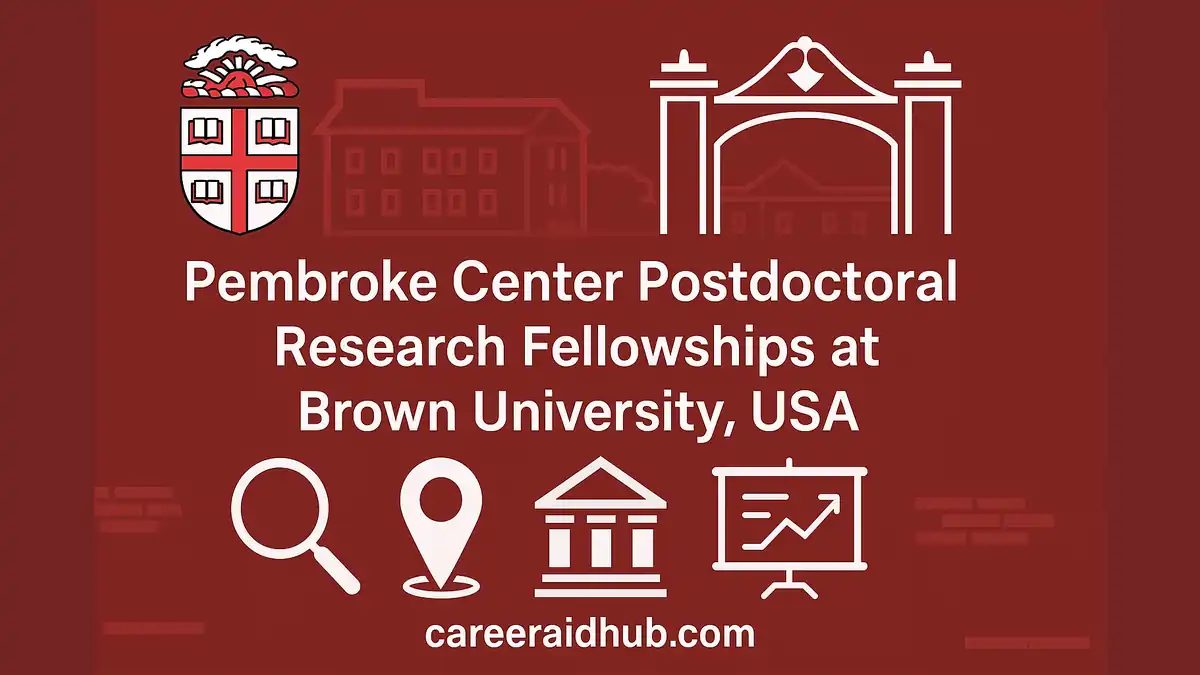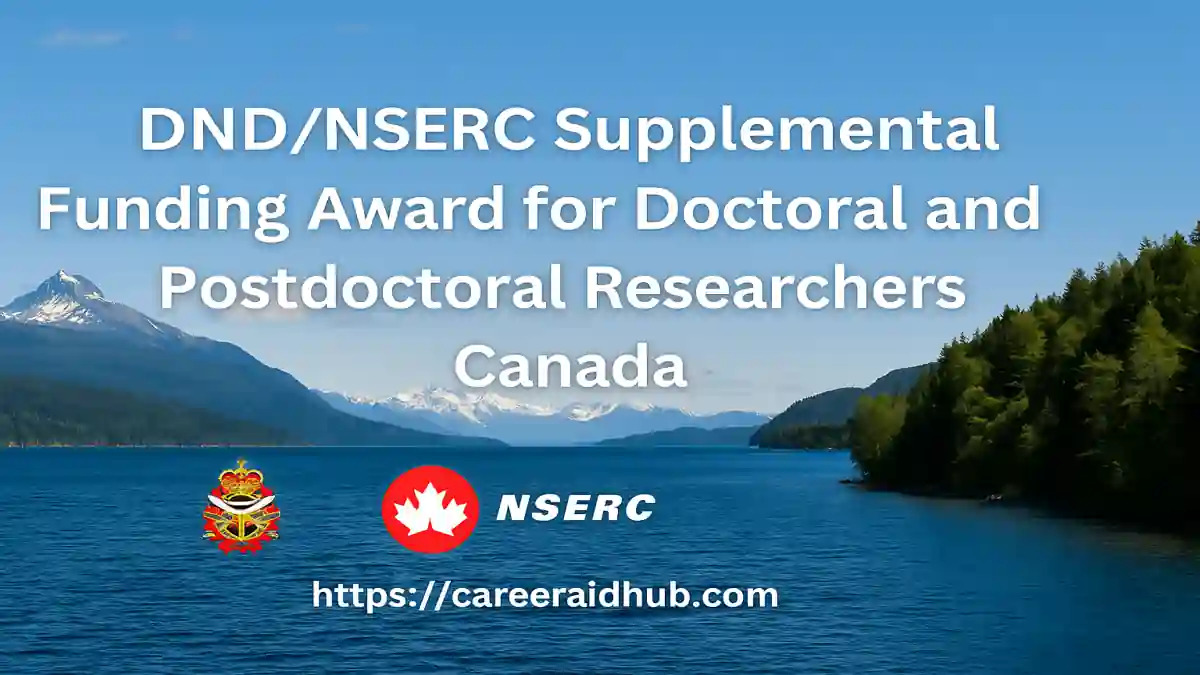Introduction: Why the CYD Distinguished Postdoctoral Fellowships Matter
Demand for experts who can secure digital infrastructure, critical systems and sensitive data has grown steadily as societies become more connected and more vulnerable. The CYD Distinguished Postdoctoral Fellowships respond to this need by funding promising researchers to work at the interface of cybersecurity, data science and national cyber-defence in Switzerland. According to the official EPFL CYD Distinguished Postdoctoral Fellowships page, the scheme provides up to two years of salary, research and conference funding for postdoctoral projects hosted by Swiss universities and carried out at the CYD Campus.
Fast-track your cyber-defence research career with the CYD Distinguished Postdoctoral Fellowships in Switzerland. This fully funded program supports two years of high-impact postdoctoral work at EPFL-affiliated labs and the CYD Campus, combining academic freedom with real-world national security challenges. Ideal for early-career scientists in cybersecurity, AI, privacy and data science.
What Are the CYD Distinguished Postdoctoral Fellowships?
A Flagship Postdoctoral Track Within the CYD Talent Program
The CYD Distinguished Postdoctoral Fellowships form the most senior track of the broader “CYD Fellowships – A Talent Program for Cyber-Defence Research.” This talent program currently includes Master Thesis, Doctoral and Distinguished Postdoctoral fellowships, all designed to build a pipeline of specialists capable of tackling
Within this ecosystem, the Distinguished Postdoctoral Fellowships specifically support researchers who have already completed their PhD and wish to lead an independent, high-impact project. Fellows are:
-
- Hosted by a Swiss higher education institution (EPFL, ETH Zurich, universities or universities of applied sciences).
- Embedded within the CYD Campus, which acts as a national cyber-defence competence centre. (EPFL)
This dual structure means you are simultaneously part of an academic lab and part of a public-sector cyber-defence initiative. As a result, your project is expected to be both scientifically rigorous and strategically relevant.
Core Objectives of the Fellowship
The programme is built around a clear mission: to support cross-cutting research that strengthens Swiss cyber-defence capabilities while advancing the frontiers of security and data science. In practical terms, a successful CYD postdoctoral project must: (EPFL)
-
- Make a significant contribution to security and data-science research, not just incremental improvements.
- Deliver insights or tools that can have concrete impact on Swiss cyber-defence, whether through better detection, resilient systems, improved privacy or secure architectures.
- Bring together researchers at the CYD Campus with at least one Swiss higher education institution in a genuinely collaborative way.
Because of this emphasis, proposals that merely repackage a generic postdoctoral project without clear links to
Focus Areas: Cyber-Defence, Security, Data and AI
Key Thematic Pillars
The CYD Distinguished Postdoctoral Fellowships are open to a broad range of topics, as long as they sit squarely within cyber-defence or adjacent security domains. Officially, the program highlights several priority pillars:
-
- Protection of cyber and cyber-physical systems – safeguarding the confidentiality, integrity and availability of systems ranging from critical infrastructure to IoT and industrial control.
- Information sharing, data fusion and crowdsourcing – developing methods to combine diverse data sources for more effective threat detection and situation awareness.
- Data science and AI for cyber-relevant data – building machine-learning, statistical and AI approaches tailored to security datasets, network traces or technology-relevant signals.
- Security, privacy and digital trust technologies – advancing cryptography, privacy-preserving protocols, secure identity systems and trustworthy digital infrastructures.
Examples of Recent CYD Projects
Although your own proposal must be original, it helps to see the types of projects that have already been funded under the CYD umbrella. For instance, recent CYD Fellows have tackled:
-
- Evaluation methods for privacy-enhancing technologies.
- More practical encrypted databases supporting complex queries.
- Security and usability of blockchain networks.
- Machine-learning security and privacy in real-world settings.
These projects illustrate the programme’s appetite for
If you want to compare CYD with other postdoctoral opportunities in Europe, you can also explore internal resources such as
fully funded postdoctoral fellowships in Europe on your host platform. This helps position CYD within a broader funding strategy.
Funding Package and Duration
Salary, Research Costs and Conference Support
From a practical standpoint, the CYD Distinguished Postdoctoral Fellowships are attractive because they combine full salary support with dedicated research and conference funding. According to EPFL’s official description, the fellowship covers: (EPFL)
-
- Salary contribution: Your salary, including social security benefits, follows the standard postdoctoral salary scale of the host institution.
- Research costs: Up to CHF 3,000 per year for project-specific equipment and research expenses (excluding standard IT hardware).
- Conference costs: Up to CHF 5,000 per year for travel, registration, and participation in scientific conferences or specialist meetings.
This package allows you to focus on research rather than constant grant-writing for operational expenses. At the same time, the separate conference budget is particularly valuable for early-career scholars who need to grow their networks and make their work visible.
Duration and Flexibility
The funding is available for up to two years, which
Furthermore, because the fellowship sits within a national talent program, successful completion can position you strongly for subsequent academic positions, research-intensive industry roles or further grants (for example, ERC Starting Grants or national Swiss funding schemes).
Who Can Apply? Key Eligibility Criteria
Formal Eligibility Requirements
The eligibility framework is intentionally open, allowing a wide international talent pool, yet it sets clear structural conditions. As of the latest call, applicants must meet the following requirements:
-
- Nationality: Citizens of any country are welcome to apply; there are no nationality restrictions.
- Age limits: No formal age limits apply. What matters more is your academic trajectory and potential.
- Endorsement: At Stage 2, you must have the endorsement of a professor employed at a Swiss higher education institution who is willing to supervise your project.
- Host laboratory: Your CYD-funded postdoctoral research must be carried out in a different laboratory from your PhD lab and, where relevant, your current postdoctoral lab.
This last criterion is important. It ensures that the fellowship encourages genuine mobility and exposure to new research cultures, rather than simply extending an existing position.
Ideal Applicant Profile
Meeting the formal criteria is only the starting point. In practice, successful applicants typically demonstrate:
-
- A strong publication record relative to their career stage, ideally with work in reputable security, networking, cryptography or data-science venues.
- Evidence of independent thinking, such as leading projects, mentoring junior colleagues or initiating collaborations.
- Clear motivation to engage with real-world cyber-defence questions, not just purely theoretical topics.
- The ability to communicate complex ideas clearly to interdisciplinary stakeholders, including technical experts and policy-oriented partners.
If your profile is still developing, you may want to strengthen your CV before applying. Resources such as
how to write an academic CV for postdoctoral fellowships can be helpful as you refine your track record and presentation.
Application Timeline and Future CYD Calls
Current Call and Typical Schedule
The CYD Fellowships operate on a two-call-per-year model for Doctoral and Distinguished Postdoctoral Fellowships—usually one call around late spring and another toward the end of the year.
For the current cycle, official announcements indicate that the 13th call for Doctoral and Distinguished Postdoctoral Fellowships will open in December 2025, with the Stage 1 submission deadline scheduled for February 2026. Because precise dates may change slightly, it is best to treat these as indicative and check again closer to the deadline.
In your article or landing page, you should phrase this as, for example:
“The next Stage 1 deadline is expected in February 2026 (we will update soon once the exact date is confirmed).”
This formulation keeps the content accurate, avoids hard-coding dates that could become outdated, and remains AdSense-friendly.
Two-Stage Selection Process
Stage 1: Pre-Proposal and Fit Assessment
The CYD Distinguished Postdoctoral Fellowships use a two-stage selection process, which helps the committee manage a large pool of applicants while ensuring that only well-aligned, high-potential projects move forward. (EPFL)
In Stage 1:
-
- You submit a pre-proposal (Stage 1 application) via the online submission platform.
- A CYD Campus internal committee, chaired by the Director of the CYD Campus, evaluates your application.
- The main criteria at this stage are:
- Your fit with the CYD Campus, including your background and motivation.
- The alignment between your pre-proposal and the aims of the program, especially its relevance to Swiss cyber-defence.
Shortlisted candidates are then assigned a prospective CYD Campus mentor. This mentor plays a decisive role: they will interview you, assess both your scientific potential and your understanding of real-world cyber-defence needs, and then decide whether to endorse you for Stage 2. Only applicants endorsed by their CYD Campus mentor can proceed. (EPFL)
Stage 2: Full Proposal and Final Decision
In Stage 2:
-
- Shortlisted and endorsed applicants are invited to submit a full research proposal.
- You must provide more detailed work packages, methodology, risk analysis, timelines, letters of support, and confirmation of your host professor’s endorsement.
- A committee chaired by the Director of the CYD Campus and composed of members from Swiss higher education institutions evaluates these full proposals.
The committee considers:
-
- Scientific excellence and originality.
- Feasibility within the two-year timeframe.
- Strategic relevance to Swiss cyber-defence.
- Quality of collaboration between the CYD Campus and the host institution.
Final decisions are typically announced a few months after the Stage 2 submission deadline, allowing new fellows to start their projects on a predictable schedule.
How to Apply: Practical Steps and Tools
Step 1: Study the Official Guidelines and Toolkit
Before drafting anything, carefully read the application guidelines and application toolkit available via the official EPFL and CYD webpages. These documents contain the precise formatting rules, page limits, evaluation criteria and required annexes. (EPFL)
Make sure you understand:
-
- The expected structure of the project description.
- The templates for CVs, publication lists and budget justifications.
- The role of the host professor and CYD mentor in the process.
Step 2: Identify and Secure a Swiss Host Professor
Because endorsement is mandatory at Stage 2, you should begin conversations with potential host professors well before the official call opens. When approaching potential hosts:
-
- Explain clearly why your work complements their existing research.
- Emphasize the added value of bringing a CYD fellowship to their lab.
- Share a concise, one-page concept note before asking for a meeting.
Early engagement not only helps you refine your idea but also convinces potential hosts that you are serious and well prepared.
Step 3: Shape a Coherent Pre-Proposal for Stage 1
Your Stage 1 pre-proposal should be concise yet persuasive. Aim to:
-
- Define a clear research question linked explicitly to cyber-defence.
- Outline your proposed approach without going into excessive technical detail.
- Demonstrate how your work leverages both the host institution’s expertise and the CYD Campus environment.
- Highlight key career achievements that illustrate your capacity to deliver.
At this stage, reviewers want to see potential and alignment more than fully polished work packages.
Step 4: Develop a Detailed Stage 2 Proposal
If you are shortlisted and endorsed by a CYD mentor, you can then prepare the Stage 2 full proposal. Here, greater depth is essential:
-
- Methodology: Explain step-by-step how you will conduct your research, including datasets, experimental setups, modelling techniques and validation approaches.
- Work plan: Break down the two-year period into work packages with milestones and deliverables.
- Risk management: Address scientific, technical and ethical risks, and propose mitigation strategies.
- Impact plan: Show how your results could be translated into tools, guidelines or policy-relevant insights for Swiss cyber-defence actors.
Including a brief section on open science practices (for example, code sharing, reproducible research and responsible disclosure for security findings) can also strengthen your application, provided it remains compatible with any confidentiality or security requirements.
How to Prepare a Strong CYD Postdoctoral Application
Align Tightly With CYD Themes
Start by positioning your project clearly within one or more of the official focus areas. Instead of simply labelling your project as “cybersecurity,” demonstrate how it:
-
- Protects specific types of systems (e.g., industrial control, satellite networks, 5G).
- Uses data-driven or AI-based techniques tailored to security datasets.
- Addresses privacy and digital-trust challenges that are highly relevant for national infrastructure.
When readers can immediately see the connection between your proposal and the CYD mission, they find it easier to advocate for your application.
Demonstrate Scientific Excellence and Independence
Because the programme is highly selective, you need to show that you can lead an independent project. You can do this by:
-
- Highlighting first-author or corresponding-author papers in respected conferences and journals.
- Emphasizing previous experience in supervising students, coordinating projects, or driving collaborations.
- Providing a coherent narrative around your research trajectory rather than listing isolated achievements.
Avoid overly promotional language; instead, use a balanced, evidence-based tone that is compatible with Google AdSense guidelines and credible to expert reviewers.
Build a Credible Collaboration Plan
The CYD Campus is not just a logo on the application; it is meant to be an active partner. To demonstrate genuine collaboration:
-
- Describe how you will divide tasks between the host lab and CYD teams.
- Mention regular interaction points, such as joint seminars, co-supervised students, or shared infrastructure.
- Clarify how CYD mentors will help you access relevant stakeholders, data or testbeds.
Such details show that you have thought beyond the individual project and into the broader ecosystem.
Expert Insights and Actionable Tips
To make your article attractive for backlinks and genuinely helpful to applicants, you can share a few expert insights:
-
- Start at least 6–9 months in advance. This gives enough time to refine the idea, secure a host and iterate on drafts.
- Run an internal peer review. Ask colleagues experienced with Swiss or European funding schemes to critique your proposal.
- Balance ambition and feasibility. Propose something challenging but clearly achievable in 24 months with realistic milestones.
- Show awareness of ethical and societal implications. Cyber-defence projects often have dual-use aspects; acknowledging and addressing them reflects maturity.
These practical insights make your guide more than a simple restatement of the official call and encourage other sites to reference your article as a resource.
Conclusion: Is the CYD Distinguished Postdoctoral Fellowship Right for You?
The CYD Distinguished Postdoctoral Fellowships offer a rare combination of fully funded postdoctoral support, access to leading Swiss research labs and a direct connection to national cyber-defence priorities. For early-career researchers who want their work to matter beyond publications, this programme provides a powerful platform to influence how societies defend their digital infrastructures. As the official EPFL CYD Fellowship pages [2] emphasize, the scheme is highly competitive and centred on excellence, collaboration and strategic relevance to Swiss cyber-defence.
Key Program Snapshot
| Feature | Details |
| Program Name | CYD Distinguished Postdoctoral Fellowships – A Talent Program for Cyber-Defence Research |
| Host Country | Switzerland (EPFL, ETH Zurich and other Swiss higher education institutions) |
| Funded By | EPFL Research Office and Cyber-Defence (CYD) Campus, supported by armasuisse Science and Technology |
| Duration | Up to 24 months (2 years) of postdoctoral funding |
| Study Mode | Full-time, on-site research at CYD Campus and a Swiss host institution |
| Eligibility | Postdoctoral researchers of any nationality, endorsed by a professor at a Swiss higher education institution; research must be hosted in a different lab than the PhD/current postdoc |
| Financial Support | Competitive salary (as per host salary scale) plus up to CHF 3,000/year research costs and CHF 5,000/year conference costs |
| Fields of Study | Cyber-defence, cybersecurity, cyber-physical systems, data science & AI, privacy, security and digital trust technologies |
| Deadline | Next Stage 1 deadline expected in February 2026 (we will update soon when the exact date is confirmed) |
| Official Website | Click here |
References
[1] Official CYD Distinguished Postdoctoral Fellowships page (EPFL)
[2] CYD Fellowships – A Talent Program for Cyber-Defence Research (EPFL overview and call timeline)
Frequently Asked Questions (FAQS)
The CYD Distinguished Postdoctoral Fellowship is a fully funded Swiss program supporting two years of advanced cyber-defence research at CYD Campus and partner universities.
Eligible applicants hold or soon complete a PhD, propose cyber-defence research, and secure support from a professor at a Swiss higher education institution.
Yes, international candidates from any country may apply, provided they meet academic requirements and collaborate with an eligible Swiss host institution and CYD Campus.
The fellowships focus on cybersecurity, cyber-physical systems, artificial intelligence for security, privacy-preserving technologies, data science for cyber-defence, and digital trust frameworks relevant to national security.
The CYD Distinguished Postdoctoral Fellowship usually funds up to twenty-four months of full-time research, although final duration depends on project scope and selection committee decisions.
The fellowship usually covers a competitive postdoctoral salary, plus dedicated budgets for research costs, specialised equipment, and international conference travel related to cyber-defence research.
You first submit a concise Stage 1 pre-proposal, then, if shortlisted and endorsed by a CYD mentor, you prepare a detailed Stage 2 full application.
Yes, you must obtain endorsement from a professor at a Swiss higher education institution who agrees to host and supervise your CYD-funded postdoctoral project.
Applications typically include a research proposal, CV, publication list, motivation statement, host professor endorsement, budget estimates, and any additional forms specified in the official guidelines.
The fellowship strengthens your publication record, builds high-level cyber-defence networks, and enhances your prospects for future faculty positions or major competitive research grants.










